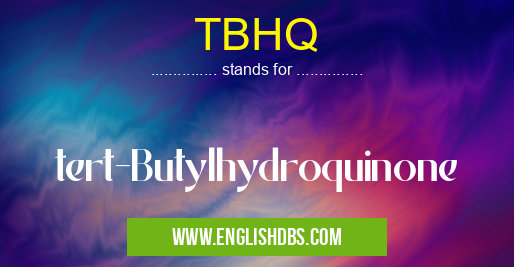What does TBHQ mean in FOOD & NUTRITION
Tert-Butylhydroquinone (TBHQ) is a synthetic antioxidant widely used in food production and other industries. Originally developed as an industrial preservative, it is now commonly used as an additive in processed foods, cosmetics, and pharmaceuticals. TBHQ is most commonly found in snacks, processed meats, fats and oils, cereals, frozen dinners, edible oils, breads and crackers. This article will discuss what TBHQ is and its potential health risks.

TBHQ meaning in Food & Nutrition in Miscellaneous
TBHQ mostly used in an acronym Food & Nutrition in Category Miscellaneous that means tert-Butylhydroquinone
Shorthand: TBHQ,
Full Form: tert-Butylhydroquinone
For more information of "tert-Butylhydroquinone", see the section below.
Definition
TBHQ stands for Tert-Butylhydroquinone. It is a synthetic compound which acts as an antioxidant to inhibit the oxidation of certain food components that can cause spoiling or discoloration over time. TBHQ has been approved by the U.S. Food & Drug Administration (FDA) for use as a food additive in small amounts to help preserve certain foods. However, it has come under scrutiny for potential safety concerns related to its use in foods due to its chemical structure which can cause adverse reactions when consumed in large quantities over long periods of time.
Potential Health Risks of TBHQ
The potential risks associated with TBHQ consumption are based on animal research studies that found high levels of the compound may cause organ damage, increased risk of cancer, weight gain and reproductive issues such as infertility or birth defects. For humans there have not been any significant studies done yet so it is unclear if these results could be replicated in humans consuming high levels of the substance over long periods of time. Additionally some experts suggest that even short exposures to large amounts of TBHQ may be linked to adverse health effects such as headaches and nausea and so caution should be taken with prolonged use or consumption of very large doses of the compound at once.
Essential Questions and Answers on tert-Butylhydroquinone in "MISCELLANEOUS»FOOD"
What is tert-Butylhydroquinone (TBHQ)?
TBHQ is an artificial food additive and preservative that has been used since the 1960s to extend the shelf life of processed foods. It is a synthetic antioxidant derived from petroleum and is chemically similar to the compound benzene. The most common side effect associated with its use is indigestion.
How does TBHQ work?
TBHQ works by preventing oxygen from entering and reacting with fats in food products, which can cause spoilage. This helps preserve the taste, texture, and color of the product for a longer period of time.
What types of products may contain TBHQ?
TBHQ may be found in a variety of processed foods such as snack crackers, french fries, pre-made dinners, microwave popcorn, store bought cookies or baked goods containing partially hydrogenated oils, breakfast cereals, vegetable oil spread sticks, frozen pizza crusts, vegetable oils, and margarine spreads.
Is TBHQ unhealthy?
According to research conducted by the Food and Drug Administration (FDA), consuming small amounts of TBHQ on a daily basis (up to 0.02 percent of total oil content) is considered safe for people over 12 years old. However there are no definitive studies demonstrating long-term health effects from consuming large amounts of this additive regularly throughout one’s life span.
Does TBHQ cause cancer?
While studies have suggested that there could be an association between excessive consumption of TPHQ with certain cancers including leukemia, lymphoma and stomach cancer; however more research needs to be done before any conclusions can be drawn regarding these potential links.
Are there any alternatives for TBHQ?
Many manufacturers have begun using alternative preservatives such as rosemary extract or natural antioxidants instead of TBHQ because they do not have health risks associated with them like those linked to TBHQ. Additionally some companies are now using naturally fermented cultures such as kefir or yogurt to extend shelf life without relying on artificial additives like tertiary butyl hydroquinone.
Why do some food producers still use TBHQ?
Despite its potential health risks, many food manufacturers continue to use it because it costs so little compared to other additives that may offer similar results. Additionally it has been found to be very effective at preserving foods for long periods of time without causing any negative changes in flavor or texture.
What are some warning signs if I'm consuming too much TPHQ?
Excessive consumption of TPHQ may lead to nausea, vomiting or stomach discomfort due to indigestion issues caused by the presence of this additive in the body over prolonged periods of time.
Final Words:
Overall while there are potential health risks associated with consuming high levels of TBHQ there also appears to be no clear evidence suggesting that small amounts used in food products pose any real danger to human health. Large scale studies would need to be conducted before any definitive conclusions can be reached but until then it may be best to err on the side of caution when considering using products containing this compound especially if you are pregnant or already suffering from any pre-existing conditions such as allergies or asthma where chemicals like TBHQ could potentially negatively effect your health even more significantly than those without these types of preexisting conditions.
